
CANADIAN THEATRE REVIEW
Scope & Guideline
Advancing Critical Dialogue in Theatre Studies.
Introduction
Aims and Scopes
- Participatory and Community-Engaged Theatre:
The journal emphasizes the significance of participatory and community-engaged theatre practices, showcasing how these forms can foster social change and community connections. - Intersectionality and Identity in Performance:
Research in the journal often explores themes of identity, including race, gender, and disability, analyzing how these intersect with theatrical practices and representations. - Political and Social Commentary through Theatre:
The journal highlights the role of theatre as a medium for political and social commentary, reflecting on current events and historical narratives through a theatrical lens. - Innovation in Performance Practices:
The Canadian Theatre Review showcases innovative performance practices, including the integration of technology in theatre and new methodologies in performance creation. - Exploration of Indigenous Voices and Perspectives:
The journal prioritizes the inclusion of Indigenous voices and perspectives, contributing to a broader understanding of theatre's role in representing diverse cultural narratives.
Trending and Emerging
- Climate Change and Sustainability in Theatre:
An increasing number of papers are addressing the intersection of theatre and environmental issues, highlighting how performances can raise awareness and provoke action regarding climate change. - Digital and Hybrid Theatre Practices:
The rise of digital and hybrid formats in theatrical presentations is a prominent theme, as the journal explores how these practices redefine audience experiences and artistic expression. - Health and Wellbeing in Performance:
There is a growing focus on health-related themes, particularly how theatre can serve as a medium for discussing illness, recovery, and community healing. - Anti-Colonial and Decolonial Practices:
Emerging discussions around anti-colonial and decolonial practices in theatre are gaining traction, emphasizing the importance of Indigenous narratives and the critique of colonial legacies. - Interdisciplinary Collaborations:
The journal is increasingly documenting interdisciplinary collaborations that merge theatre with other art forms and social practices, reflecting a broader trend towards integrative artistic expressions.
Declining or Waning
- Traditional Theatre Forms:
There seems to be a decline in the focus on traditional theatre forms, such as classical plays and conventional staging methods, as the journal increasingly embraces experimental and contemporary practices. - Eurocentric Perspectives:
Papers that solely focus on Eurocentric perspectives in theatre are becoming less frequent, indicating a shift towards more inclusive and diverse viewpoints. - Commercial Theatre Analysis:
Analysis of mainstream commercial theatre seems to be waning, replaced by a focus on grassroots, community-driven, and socially engaged performances. - Historical Retrospectives:
While historical analysis still holds value, there is a noticeable decrease in papers that strictly focus on historical retrospectives without connecting them to contemporary issues or practices. - Conventional Audience Engagement:
There is a decline in discussions surrounding conventional audience engagement strategies, with more emphasis now on innovative and immersive experiences.
Similar Journals
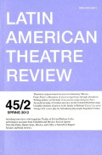
LATIN AMERICAN THEATRE REVIEW
Empowering Voices in the World of Latin American TheatreLATIN AMERICAN THEATRE REVIEW, published by the University of Kansas, serves as a vital scholarly resource in the field of theatre studies, specifically focusing on the rich tapestry of Latin American theatrical works and their cultural significance. With an ISSN of 0023-8813 and an E-ISSN of 2161-0576, this journal is committed to disseminating innovative and critical insights that facilitate the understanding of contemporary and historical performance arts in Latin America. Despite its Q4 ranking in the Visual Arts and Performing Arts category, it plays an important role in bridging gaps within academic literature, particularly from 2002 to 2024, by attracting contributions from researchers and practitioners alike. While the journal does not currently offer an open access model, it is highly regarded as a platform for both established and emerging scholars. The LATIN AMERICAN THEATRE REVIEW not only emphasizes the importance of theatrical practices but also enriches broader discussions on cultural identity and social issues within Latin America, making it an essential read for anyone passionate about the performing arts.
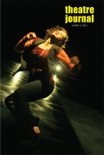
THEATRE JOURNAL
Illuminating the Intersection of Literature and Performance.THEATRE JOURNAL, published by the Johns Hopkins University Press, stands as a distinguished platform within the realms of literature and performing arts. With an ISSN of 0192-2882 and an E-ISSN of 1086-332X, this journal has made significant strides since its inception, with coverage extending from 2002 to 2024. It proudly holds a Q2 quartile ranking in both Literature and Literary Theory and Visual Arts and Performing Arts, positioning itself among the top-tier publications in its field, as indicated by its Scopus ranks at the 69th and 59th percentiles respectively. While the journal is not available as open access, it remains a crucial resource for researchers, professionals, and students committed to advancing the understanding of theatrical studies. The Theatre Journal seeks to inspire critical dialogue and innovation regarding the dynamics of theatre, making it an invaluable asset for anyone invested in theatrical scholarship and performance practices.

Synthesis-La Plata
Unlocking knowledge in Literature and Linguistics.Synthesis-La Plata is an esteemed academic journal published by UNIV NAC LA PLATA, FAC HUMANIDADES & CIENCIAS EDUC, focusing on the fields of Arts, Humanities, and Social Sciences, with a particular emphasis on Literature, Literary Theory, and Linguistics. Since its inception in 2009, this Open Access journal has been dedicated to providing a platform for scholarly discourse and innovative research, allowing unrestricted access to a multitude of international studies. Although it experienced a hiatus in its Scopus coverage between 2012 and 2014, the journal continues to foster critical analysis and promotes interdisciplinary approaches within its domains. With an ISSN of 0328-1205 and an E-ISSN of 1851-779X, Synthesis-La Plata aims to reach a diverse readership, including researchers, educators, and students who seek to deepen their understanding of literary and linguistic dynamics. Despite its recent Scopus rankings indicating low percentiles, the journal remains a significant resource for scholarly inquiry in the humanities."
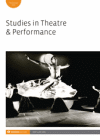
Studies in Theatre and Performance
Pioneering Research in the Realm of Visual and Performing ArtsStudies in Theatre and Performance is a distinguished academic journal published by Routledge Journals, Taylor & Francis Ltd, dedicated to advancing scholarship in the dynamic fields of visual arts and performing arts. Since its inception in 2000, the journal has become an essential resource for researchers and professionals, exemplified by its ranking within the Q2 category of visual and performing arts, and its commendable position at the 76th percentile among its peers. With an ISSN of 1468-2761 and an E-ISSN of 2040-0616, the journal serves as a platform for insightful research, critique, and innovation across a variety of topics in theatre and performance studies. Although it operates under a traditional access model, its rigorous peer-review process ensures that every publication contributes significantly to the broader understanding of theatrical practices and performance methodologies. As we move towards 2024, Studies in Theatre and Performance continues to be a vital reference point for scholars and practitioners alike in exploring new dimensions of performance theory and practice in an ever-evolving cultural landscape.
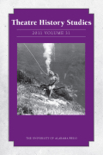
THEATRE HISTORY STUDIES
Connecting Past and Present through Performance ResearchTHEATRE HISTORY STUDIES, published by University of Alabama Press, serves as an essential platform for scholarly discourse and research in the fields of Cultural Studies and Visual Arts and Performing Arts. With an ISSN of 0733-2033, this journal offers critical insights into the evolution of theatre and performance, positioning itself as a valuable resource for researchers and practitioners alike. Despite its niche focus, it holds a commendable ranking in Scopus, reflecting its cultural significance and academic rigor—ranked #356 out of 667 in Visual Arts and Performing Arts and #911 out of 1304 in Cultural Studies. The journal has published continuously from 2002 to 2012, and again in 2014 to 2019, as well as from 2021 to 2023, consistently fostering a rich dialogue around artistic practices and historical contexts. Although not open access, its articles are pivotal for advancing knowledge and inspiring new perspectives in the interplay of theatre, culture, and society. For those dedicated to understanding the intricate tapestry of performance studies, THEATRE HISTORY STUDIES is a must-read.

Applied Theatre Research
Cultivating Knowledge at the Heart of Applied TheatreApplied Theatre Research is a distinguished journal published by Intellect Ltd, focusing on the dynamic intersection of theatre, cultural studies, literature, and the performing arts. With the ISSN 2049-3010 and E-ISSN 2049-3029, this publication has carved a niche for itself in academic circles, evidenced by its categorization in various Scopus metrics, including ranking in the top quartiles for literature and literary theory, visual arts, and performing arts. The journal caters to a global audience and is recognized for its significant contribution to the understanding and development of applied theatre concepts and practices. As an essential resource for researchers, professionals, and students alike, it aims to foster interdisciplinary dialogue and exploration, making crucial strides in identifying the transformative role of theatre in diverse societal contexts. The journal operates under a rigorous peer-review system to ensure the highest academic standards, embracing open access to foster wider dissemination of knowledge. With a convergence period extending from 2017 to 2024, it continues to impact the academic landscape, holding a substantial place within the broad field of cultural studies.
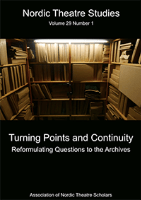
Nordic Theatre Studies
Illuminating the Stage: Nordic Traditions and Innovations.Nordic Theatre Studies is a prestigious academic journal published by FORENINGEN NORDISKA TEATERFORSKARE, dedicated to the field of visual arts and performing arts, with a special emphasis on Nordic traditions and contemporary practices. With an ISSN of 0904-6380 and E-ISSN of 2002-3898, this journal serves as a vital forum for scholars, theatre practitioners, and students looking to explore the rich tapestry of Nordic theatre. Recognized for its quality, it ranks in the Q3 category in the latest 2023 rankings and boasts a significant position in the Scopus database, standing at Rank #209/667 with a 68th percentile. The journal, covering converged years from 2011 to 2012 and 2014 to 2023, provides open access to a variety of research articles, reviews, and theoretical explorations that address both historical and contemporary issues in theatre studies. By bridging academic rigor with practical insights, Nordic Theatre Studies aims to contribute to the dialogue surrounding the evolving landscape of theatre, making it an indispensable resource for researchers and practitioners alike.
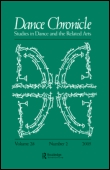
DANCE CHRONICLE
Exploring the Rhythm of Dance ScholarshipDANCE CHRONICLE, an esteemed journal published by Routledge Journals, Taylor & Francis Ltd, serves as a vital platform for the exploration and examination of dance in its multifaceted forms. Established in 1977 and continuing its commitment to the field, this journal engages researchers, professionals, and students alike, providing critical insights into dance history, theory, and contemporary practice. With an impressive track record spanning over four decades, it garners a significant standing within the Visual Arts and Performing Arts categories, evidenced by its Scopus ranking at 282 out of 667, placing it in the 57th percentile. While currently not operating under an open-access model, DANCE CHRONICLE remains an essential resource for those involved in the scholarly analysis and appreciation of dance, making contributions that enrich the cultural and academic dialogues surrounding this dynamic art form.

ASIAN THEATRE JOURNAL
Navigating the Intersections of Culture and TheatreASIAN THEATRE JOURNAL, published by University of Hawaii Press, is a distinguished scholarly journal dedicated to the exploration of theatrical arts in Asia. With its ISSN 0742-5457 and E-ISSN 1527-2109, the journal serves as a crucial platform for researchers, practitioners, and students interested in the dynamic intersections of culture, performance, and social commentary within Asian theatre traditions. As of 2023, it proudly holds a Q2 ranking in the fields of Visual Arts and Performing Arts, highlighting its significance and influence in shaping academic discourse. The journal is indexed in Scopus, ranking at #257 out of 667 in the Arts and Humanities category, placing it in the 61st percentile. Despite not being open access, ASIAN THEATRE JOURNAL remains committed to fostering a deeper understanding of Asian theatrical practices and their global implications. With a convergence of years from 2002 to 2024, it promises to be an invaluable resource for those seeking to delve into the richness of Asian performance traditions.

Stanislavski Studies
Illuminate Your Understanding of Stanislavski's Influence.Stanislavski Studies is a distinguished academic journal dedicated to exploring the profound impact of Konstantin Stanislavski's methodologies on the field of performing arts. Published by Routledge Journals, Taylor & Francis Ltd, this journal has quickly established itself as a leading resource since its inception in 2012, achieving a Q1 ranking in both Visual Arts and Performing Arts categories as of 2023. With a Scopus Rank of #181 out of 667, it occupies a prominent position within the 72nd percentile in Arts and Humanities, affirming its significance to scholars and practitioners alike. Although currently not an Open Access journal, it provides crucial insights and scholarly articles that delve into Stanislavski's techniques, applications, and influence on contemporary theater practices. Based in the United Kingdom, the journal aims to facilitate rigorous scholarship and stimulate discussions among researchers, professionals, and students passionate about the performing arts, thereby contributing to the ongoing evolution of theater education and practice.